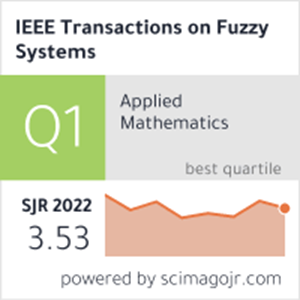模糊哈希网络在医学图像检索中的应用
IF 11.9
1区 计算机科学
Q1 COMPUTER SCIENCE, ARTIFICIAL INTELLIGENCE
引用次数: 0
摘要
医学成像技术的快速发展导致医学图像数据呈指数级增长,这使得从大规模数据集中有效检索对于提高诊断准确性和速度至关重要。然而,有两个关键的挑战阻碍了这一进程:首先,医学图像中存在不确定和微妙的病变,通常难以识别;其次,医学图像数据库中不同病例类型之间的分类不平衡。这些固有的挑战显著降低了现有散列算法的性能。近年来,基于Takagi-Sugeno-Kang模糊系统(TSK-FS)的方法在医学图像建模中表现出了良好的性能。受这些进展的启发,本文提出了一种基于TSK-FS的模糊哈希网络(FHN),通过有效处理医学成像中的不确定性和数据不平衡来提高检索性能。FHN首先引入了一种新的模糊化机制,该机制结合了自注意机制的概念,有效地捕获了医学图像中复杂的潜在特征,从而增强了模糊空间中的数据可辨别性。同时,通过引入Transformer网络,提出了一种新的顺次参数学习机制,以提高FHN的推理效率和泛化能力。基于这两种机制,FHN分析和处理不确定数据的能力显著增强。此外,在强调局部结构信息的同时,设计了一种新的哈希中心损失来捕捉全局关系,从而改进了对不平衡数据的处理,显著提高了检索性能。本文章由计算机程序翻译,如有差异,请以英文原文为准。
FHN: Fuzzy Hashing Network for Medical Image Retrieval
The rapid advancement of medical imaging technologies has led to an exponential increase in medical image data, making efficient retrieval from large-scale datasets critical for improving diagnostic accuracy and speed. However, two key challenges hinder this process: first, the presence of uncertain and subtle lesions in medical images that are often difficult to discern, and second, class imbalance across different case types within medical image databases. These inherent challenges significantly degrade the performance of existing hashing algorithms. In recent years, methods based on the Takagi–Sugeno–Kang fuzzy system (TSK-FS) have shown promising performance in medical image modeling. Inspired by these advances, this article proposes a novel fuzzy hashing network (FHN) based on TSK-FS to enhance retrieval performance by effectively handling both uncertainty and data imbalance in medical imaging. The FHN first introduces a novel fuzzification mechanism that incorporates the concept of a self-attention mechanism to effectively capture the complex underlying features in medical images, thereby enhancing the data discriminability in fuzzy spaces. Meanwhile, a new consequent parameter learning mechanism is developed for defuzzification by introducing the Transformer network, which aims to improve the inference efficiency and generalization capability of the FHN. Based on these two mechanisms, FHN’s capability of analyzing and handling uncertain data is significantly enhanced. Furthermore, a novel hash center loss is designed to capture global relationships while emphasizing local structural information, thereby improving the handling of imbalanced data and significantly enhancing retrieval performance.
求助全文
通过发布文献求助,成功后即可免费获取论文全文。
去求助
来源期刊

IEEE Transactions on Fuzzy Systems
工程技术-工程:电子与电气
CiteScore
20.50
自引率
13.40%
发文量
517
审稿时长
3.0 months
期刊介绍:
The IEEE Transactions on Fuzzy Systems is a scholarly journal that focuses on the theory, design, and application of fuzzy systems. It aims to publish high-quality technical papers that contribute significant technical knowledge and exploratory developments in the field of fuzzy systems. The journal particularly emphasizes engineering systems and scientific applications. In addition to research articles, the Transactions also includes a letters section featuring current information, comments, and rebuttals related to published papers.
 求助内容:
求助内容: 应助结果提醒方式:
应助结果提醒方式:


